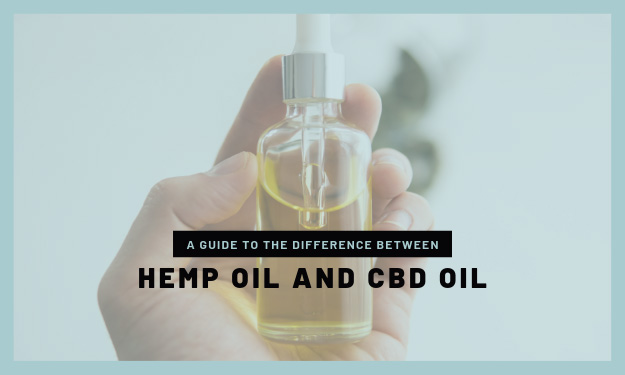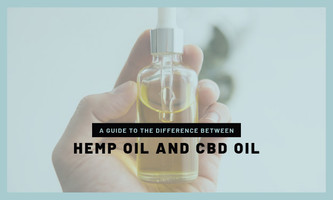A Guide to The Difference Between Hemp Oil and CBD Oil
Aug 21st 2019

Hemp and CBD oil have become extremely popular as of late, but there is still a lot of confusion about the difference between these two hemp-derived products. While they may come from the same plant, the two oils aren’t interchangeable—despite many manufacturers trying to market them as an identical product. As such, it’s important to be aware of their differences to receive the distinct benefits that are unique to each oil. From their properties to their production, here is a guide to the difference between hemp oil and CBD oil.
Hemp seed oil
Properties: Although hemp seed oil doesn’t contain any CBD oil, it does include a variety of essential omega-3 and omega-6 fatty acids—a combination rarely found in oils. According to Hemp Basics, “The oil contained in the hemp seed is 75-80% polyunsaturated fatty acids (the good fats) and only 9-11% of the lesser desired saturated fatty acids.” In addition, hemp is also high in protein, vitamin, E, and polyunsaturated acids.
Benefits: The high concentration of fatty acids and antioxidants in hemp seed oil are beneficial for moisturizing the skin and protecting cells from free radicals when used as a topical treatment. Plus, it has a comedogenic rating of zero which means it won’t clog your pores. Frequently recognized as a superfood, hemp oil is chock-full of vitamins and beneficial fatty acids which adds powerful nutritional value to many diets.
Uses: People typically use hemp seed oil as an ingredient in food and skincare products. Often considered a superfood, hemp seed oil is high in nutrients, so users will add it to drinks, make it into butter, or use it as cooking oil or salad dressing. Due to its moisturizing properties, hemp seed oil also appears in shampoos, conditioners, soap, and lotions.
How it’s made: Manufacturers derive hemp oil from hemp seeds which undergo a process called cold pressing. After being de-shelled and chilled, producers squeeze the seeds to collect their nutritious oil. This method helps to preserve the seed’s raw, nutritious content.
CBD oil
Properties: CBD oil’s main active ingredient is CBD. While the oil also often contains THC—the mind-altering component of cannabis—its levels are lower than 0.3 percent. As such, taking CBD oil in any form won’t result in any psychological effects.
Benefits: The main potential benefits of CBD oil are largely medicinal. Physical benefits of CBD oil include improved sleep, decreased inflammation, reduced pain, and soothed nausea. CBD oil also has a variety of mental health benefits such as reduced anxiety, stress, and depression. This is due to CBD’s ability to activate the serotonin, or “happy chemical,” receptor.
Uses: Many admire CBD oil as a natural alternative to prescription medications due to its many potential health benefits. A lot of people use CBD oil as a natural pain reliever and to help speed injury recovery time. Further, due to its ability to reduce stress and anxiety, CBD oil frequently acts as a natural sleep aid. Common ways to take CBD oil include tincture (placing it beneath one’s tongue and letting is absorb), topical treatment, as a pill, or added into food and drinks.
How it’s made: Unlike hemp oil, manufacturers make CBD oil by using the entire mature hemp plant—including the flower and leaves. To obtain CBD oil from the plant, producers use a process called extraction which separates the compounds. This process involves grounding the useful parts of the plant and using a solvent to help pull out the necessary components.
Before purchasing hemp or CBD oil, it is important to check the ingredients listed on the label to ensure you are purchasing your desired product. Additionally, if you’re interested in distributing CBD oil, USA Lab has all the equipment you need—we have everything from extraction units to lab freezers for sale. Contact us today at 734-304-0882 for more information.

